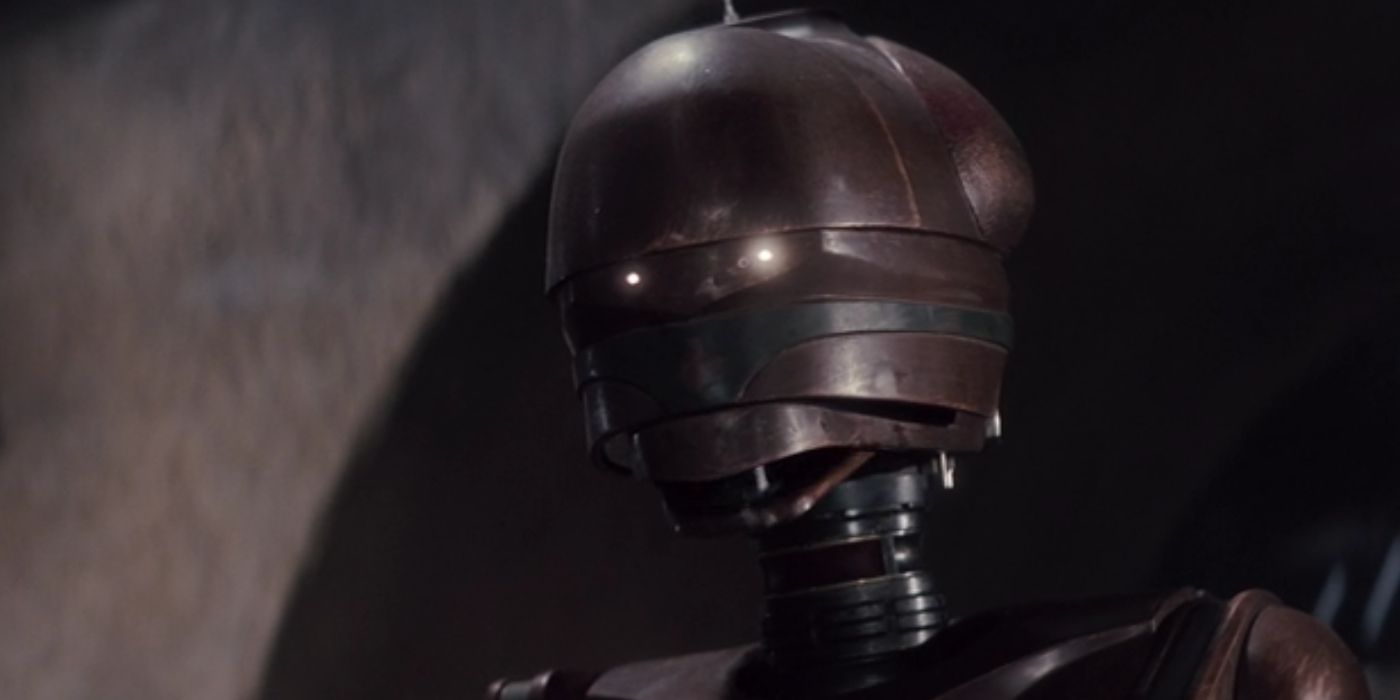In the recently released From a Certain Point of View: Return of the Jedi, Olivia Chadha’s “The Key to Remembering” focuses on EV-9D9, the torture droid in Jabba the Hutt’s Palace. Throughout the story, EV-9D9 begins to theorize that droid consciousness and free will are tied to memory. She figures out a way to prevent her own memory wipes, and EV-9D9 is able to mostly overcome her cruel programming in light of her new building experiences.This theory of memory and free will in droids is especially interesting in light of other droid rebels like R2-D2 and L3-37. EV-9D9’s theory also has important implications for the Dark Droids arc running throughout Marvel’s original trilogy era Star Wars comics. Analyzing EV-9D9’s theory reveals that droids’ ability to become sentient, either unwittingly or purposefully, has been hampered by the practice of memory wipes and the removal of continuing experience, and allowing droids to exist with their memories intact allows them to become anomalies and achieve a higher level of consciousness as well.From the beginning of Chadha’s “The Key to Remembering,” EV-9D9 is upfront about her cruelty. She views herself as a scientist. While she enjoys torturing other droids, her experiments also have a larger goal: to unlock the secret of droid consciousness. Her efforts are inhibited in part by her monthly memory wipes, per Jabba’s orders. While she has some of the data from her former experiments, EV-9D9 does not have many, if any, memory of actually enacting the past months’ torture. She also acknowledges that she may have conducted the same experiments and come to the same conclusions multiple times before.EV-9D9’s life changes when she meets R2-D2, whom she refers to as an anomaly.RELATED: Return of the Jedi’s Most Heartbreaking Scene Just Became Even More DevastatingRELATED: Star Wars Has a Droid Problem: Are They ‘People’ or Not?
In the recently released From a Certain Point of View: Return of the Jedi, Olivia Chadha’s “The Key to Remembering” focuses on EV-9D9, the torture droid in Jabba the Hutt’s Palace. Throughout the story, EV-9D9 begins to theorize that droid consciousness and free will are tied to memory. She figures out a way to prevent her own memory wipes, and EV-9D9 is able to mostly overcome her cruel programming in light of her new building experiences.
This theory of memory and free will in droids is especially interesting in light of other droid rebels like R2-D2 and L3-37. EV-9D9’s theory also has important implications for the Dark Droids arc running throughout Marvel’s original trilogy era Star Wars comics. Analyzing EV-9D9’s theory reveals that droids’ ability to become sentient, either unwittingly or purposefully, has been hampered by the practice of memory wipes and the removal of continuing experience, and allowing droids to exist with their memories intact allows them to become anomalies and achieve a higher level of consciousness as well.
From the beginning of Chadha’s “The Key to Remembering,” EV-9D9 is upfront about her cruelty. She views herself as a scientist. While she enjoys torturing other droids, her experiments also have a larger goal: to unlock the secret of droid consciousness. Her efforts are inhibited in part by her monthly memory wipes, per Jabba’s orders. While she has some of the data from her former experiments, EV-9D9 does not have many, if any, memory of actually enacting the past months’ torture. She also acknowledges that she may have conducted the same experiments and come to the same conclusions multiple times before.EV-9D9’s life changes when she meets R2-D2, whom she refers to as an anomaly.
#Star #Wars #Examines #Consciousness #Franchises #Cruelest #Droids
Note:- (Not all news on the site expresses the point of view of the site, but we transmit this news automatically and translate it through programmatic technology on the site and not from a human editor. The content is auto-generated from a syndicated feed.))



